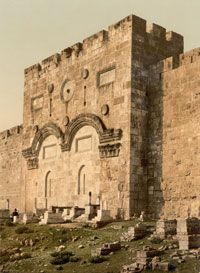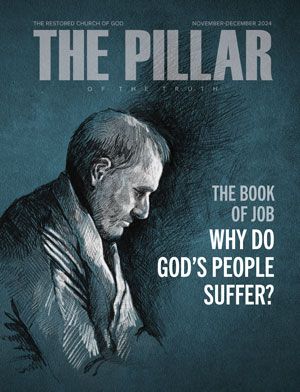From a serene dirt road that meanders its way through country woods to a six-lane superhighway paved through a bustling urban city, roads have long been an important part of civilization.
Just as various types of roads can be wide or narrow and serve different purposes, there are two distinct paths people can travel spiritually.
During the Sermon on the Mount, Jesus Christ taught: “Enter you in at the strait [narrow] gate: for wide is the gate, and broad is the way [road], that leads to destruction, and many there be which go in thereat. Because strait is the gate, and narrow is the way which leads unto life, and few there be that find it” (Matt. 7:13-14).
The account in Luke underscores just how serious this is: “Then said one unto Him, Lord, are there few that be saved? And He [Jesus] said unto them, Strive to enter in at the strait gate: for many, I say unto you, will seek to enter in, and shall not be able” (13:23-24).
Jesus’ disciples would have understood this parallel. At that time, there were roads leading into ancient Jerusalem that went through numerous gates in the magnificent stone walls of the city.
While many of Jerusalem’s gates were stately and imposing, some were smaller and modest, and would have been used less often. This was true throughout the city’s history.

Jerusalem’s Golden Gate, circa the late 1890s.
Getty Images
For example, during the time of Solomon’s Temple, the Golden Gate, which was the closest gate to the Temple, would have been busy as many people traveled to and fro for worship and sacrifice. The gate was so wide that it had a double arch spanning over the top with a column in the middle. The total width of the gate was 24 feet! Another gate, the Silwan Gate, was only five feet wide and was not traveled through as much.
The bigger Golden Gate was obvious and used by everyone. The smaller Silwan Gate was harder to find, and most people would not have used it.
What are the spiritual lessons Jesus is teaching us through this parallel?
The Wide Gate
The wide gate and broad way depict the path to spiritual destruction. Why are there so many people on it?
Revelation 12:9 says, “Satan…deceives the whole world.” If someone has not been called by God (John 6:44), they are stuck on this road.
When God called you, He pulled you off the path to destruction and onto the road to life. But even those who have been called can struggle to continue going in the right direction. There is always the danger that we could return to the broad way.
True Christianity is not for the faint of heart. As Christ said, it is the more difficult of the two paths. It comes with many challenges and involves self-denial.
Notice Matthew 16: “Then Jesus said to His disciples, If anyone desires to come after Me, let him deny himself, and take up his cross, and follow Me” (vs. 24, New King James Version).
It is counterintuitive to deny ourselves. This means rejecting the lusts and desires of our human nature. People want to go with the flow.
Proverbs 14 sums this up: “There is a way which seems right unto a man, but the end thereof are the ways of death” (vs. 12).
Strong’s Concordance defines “way” as a course of life or mode of action. It can also be a journey. The broad path may seem right, but without God’s help, man cannot find the right path in life.
The prophet Jeremiah wrote, “O Lord, I know that the way of man is not in himself: it is not in man that walks to direct his steps” (10:23).
The broad way is a carefree path that seems to have little accountability. There is plenty of room and many other people traveling in that direction, so it can feel like the correct route to take. On this road, travelers sit back, go on cruise control and head wherever life takes them. Yet it leads to sin, unhappiness and, ultimately, death (Rom. 6:23).
We must avoid this path at all costs.
The Narrow Gate
The narrow gate and difficult path are the way of a Christian. This path requires deliberate dedication to obeying God. Despite its challenges, we keep going every day, because it is the path that “leads to life” (Matt. 7:14).
What does the narrow way look like? And how do we ensure we stay on it?
Christ’s choice of words begins to paint the picture. The word “narrow” means to crowd, afflict and to suffer tribulation (Strong’s Concordance). You can probably think of times you have driven down a narrow, crowded road, barely getting by road work. Such a route can leave you feeling uncomfortable and constrained.
It is no coincidence that only a few ultimately find and stay on the strait road. Unlike its counterpart, the broad way, it is not easy. As we hold on to our beliefs, we will endure trials and hardships and can even lose our jobs, friends or family.
In II Timothy 3:12, Paul wrote, “Yes, and all that will live godly in Christ Jesus shall suffer persecution.”
Just the sound of the word “persecution” can send chills up our spine. Humanly, no one wants to go through such a thing. It is unnatural to want to take the harder road in life, as it takes more effort and can cause pain. But if we want eternal life, we must continue doing all that God requires.
One simple way to think of this: When God tells us to do something, we do it. When God tells us not to do something, we strive not to do it. We make these choices regardless of the pressures and consequences we face.
Jesus Christ is our example. I Peter 2:21 says, “For even hereunto were you called: because Christ also suffered for us, leaving us an example, that you should follow His steps.” What Jesus endured was far more difficult than anything we will face. Yet we can follow His example.
Hebrews 12:2 says, “Looking unto Jesus the author and finisher of our faith; who for the joy that was set before Him endured the cross, despising the shame, and is set down at the right hand of the throne of God.” Let the joy set before you—eternal life—motivate you to keep walking.
What should you do if you feel like you are drifting to the edge of the road? Proverbs 3 says, “Trust in the Lord with all your heart; and lean not unto your own understanding. In all your ways acknowledge Him, and He shall direct your paths (vs. 5-6).
God will guide us along the narrow path. He even gives us tools for the journey.
Navigational Tools
There are various tools we can use to ensure we stay on the narrow path. One of them is Bible study. Psalm 119:105 says, “Your word is a lamp unto my feet, and a light unto my path.”
Just as a flashlight or a car’s headlights illuminate the road ahead, consistently studying Scripture will light up the narrow way so we can keep going. God’s Word reveals which direction we are heading.
Another tool is summed up in Galatians 5: “This I say then, walk in the Spirit, and you shall not fulfill the lust of the flesh. For the flesh lusts against the Spirit, and the Spirit against the flesh: and these are contrary the one to the other: so that you cannot do the things that you would” (vs. 16-17).
If we walk according to the Holy Spirit, which is God’s nature (II Pet. 1:4), instead of our carnal human nature, we ensure we stay on the right path. Think of the Holy Spirit as your own personal navigational system to guide you. Romans 8:14 says we are “led by the Spirit of God.”
There will be times when the narrow way comes to a crossroads with the broad way. Tough decisions will need to be made to stay the course. Be sure to use this GPS that God gave you at baptism.
A third tool that will help us is meditation. King Solomon wrote, “Ponder the path of your feet, and let all your ways be established. Turn not to the right hand nor to the left: remove your foot from evil” (Prov. 4:26-27).
No matter how long you have been living God’s Way, it is vital to “ponder” where you are going. Do not just put one foot in front of the other, assuming you are going the correct way. Take time to sit quietly and reflect on your choices and decisions. Are they keeping you on the narrow way?
The last tool we will look at is counsel. We have all been in situations where we have been traveling to an unfamiliar place, become lost and had to stop and ask for directions. This allowed us to get back on track to our destination. The same can apply spiritually.
Getting counsel from God’s ministry can help us avoid falling off the side of the road. Proverbs 11:14 says, “Where no counsel is, the people fall: but in the multitude of counsellors there is safety.”
Stay on the Right Path!
Although the path of a Christian is the harder of the two, it comes with great benefits. Psalm 84:11 says, “The Lord will give grace and glory: no good thing will He withhold from them that walk uprightly.”
Get back on track if you drift back toward the broad way. David wrote in Psalm 37: “The steps of a good man are ordered by the Lord: and he delights in His way. Though he fall, he shall not be utterly cast down: for the Lord upholds him with His hand…Depart from evil, and do good; and dwell forevermore” (vs. 23-24, 27).
There are only two paths we can travel: broad or narrow. One way leads to life, and one to death. As a Christian, you are on the path to life, unless you take yourself off of it. Determine to stay the course, no matter what.
Walking long distances, physically or spiritually, can be tiring. Remember Galatians 6:9: “Let us not be weary in well doing: for in due season we shall reap, if we faint not.”
As you continue step by step on your spiritual journey, remember that the narrow path is challenging but brings great rewards. Use the tools we have looked at to keep going the right way. Continue walking with your Creator to your ultimate destination: rulership in the Kingdom of God.

















